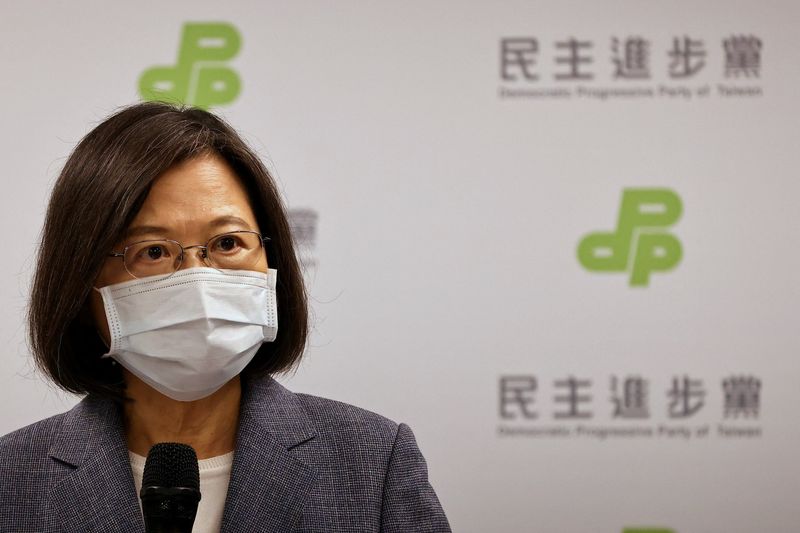The presidential race in Taiwan is heating up
2022.11.26 22:09
[ad_1]

The presidential race in Taiwan is heating up
Budrigannews.com – After the ruling Democratic Progressive Party (DPP) was defeated in local elections on Saturday, attention is now turning to Taiwan’s 2024 presidential election. President Tsai Ing-wen’s decision to focus on China backfired with voters.
In line with expectations, the Kuomintang, or KMT, the main opposition party, romped to victory in the mayoral and county elections, winning 13 of the 21 seats up for grabs, including the wealthy and cosmopolitan capital Taipei.
None of those chosen have direct say in strategy on China.
China sees the island similar to possess an area and has been sloping up military exercises to declare those cases, fuelling worldwide concern particularly given Taiwan’s significant job as a semiconductor maker.
Although the KMT strongly denies being pro-Beijing, it has a long history of favoring close ties with China.Since the presidential election defeat in 2020 and the failure of four referendums it had supported as a show of no confidence in the government in December, it had been on the back foot.
Eric Chu, the party’s chairman, told reporters at party headquarters late on Saturday that the KMT knew it could only win if it united.
He stated, “The people of Taiwan have given us an opportunity.”The KMT’s only chance of victory in the 2024 election is selflessness.
Following the defeat, which was the party’s worst performance ever, Tsai resigned as chairwoman of the DPP. She now holds just five mayor or county chief positions.
She had framed the vote as an act of defiance against China’s growing bellicosity, particularly in light of the fact that China held war games near the island in August and President Xi Jinping, who has pledged to bring Taiwan under Chinese control, won an unprecedented third term in office last month.
However, voters disassociated geopolitics from local elections, which typically focus more on issues such as crime and pollution, making Tsai’s strategy ineffective.
For Taiwan’s six most important cities, participation on Saturday was at an all-time low of 59%, compared to around 75% in 2020.
China has been focusing on its own internal issues, such as unrest related to its zero-COVID policy.
Last week, Taiwan’s Foreign Minister Joseph Wu stated that prior to the local elections, China was less likely to interfere, possibly as a result of China’s own domestic issues and efforts to improve its international image.
DPP Secretary-General Lin Hsi-yao told reporters that the party would conduct a “review” of what went wrong, but he didn’t say anything about their strategy of making the China issue so important.
The COVID-19 pandemic and the question of whether the government favored local vaccines over imported ones were at the center of the KMT’s campaign, particularly in light of this year’s spike in cases.
Taiwan’s pro-DPP Liberty Times newspaper published an editorial on Sunday stating that “abstract political ideas” are more difficult to use to motivate voters in local elections and that the DPP may face distracting divisions when selecting its 2024 presidential candidate.
“Tsai Ing-wen’s subsequent term is part of the way through, and the issue of progression might raise interior inconsistencies, harming the battle viability of having all weapons pointing outwards.”
Vice President William Lai, who took on a prominent campaigning role for the local polls and was thought by party sources to be the most likely candidate for 2024, apologized on Facebook (NASDAQ:).page on Saturday for the bad performance, but he didn’t say anything about his future.
Despite this, the DPP recovered from a similar defeat in the local elections in 2018 to win a landslide victory in the presidential and parliamentary elections in 2020. They did this by successfully presenting a vote for the KMT as a vote for China in the wake of a bloody crackdown on anti-government protesters in Hong Kong.
The KMT denies that it will sell out Taiwan to China or is not committed to democracy; however, it accuses the DPP of intentionally hyping a confrontation with Beijing for political gain.
Tsai has repeatedly offered to hold talks with China, but Beijing has rejected them because it considers her to be a separatist. The DPP denies this.
“The landslide victory of the KMT does not indicate that a political climate favorable to Beijing is developing in Taiwan.”Huang Kwei-bo, an associate professor of diplomacy at Taipei’s National Chengchi University and a former KMT deputy secretary general, said that the KMT is not a party that supports Beijing.”
[ad_2]








